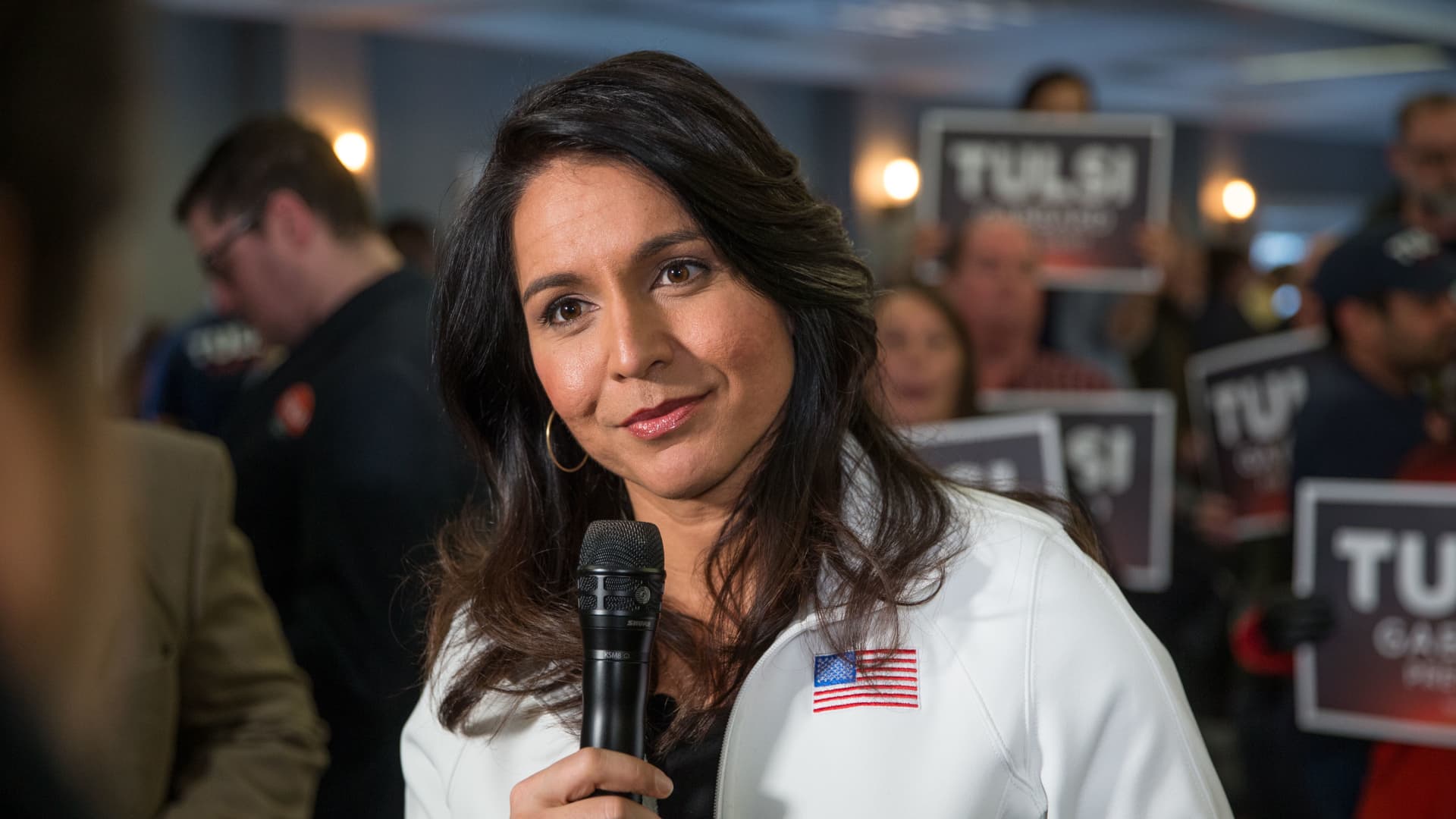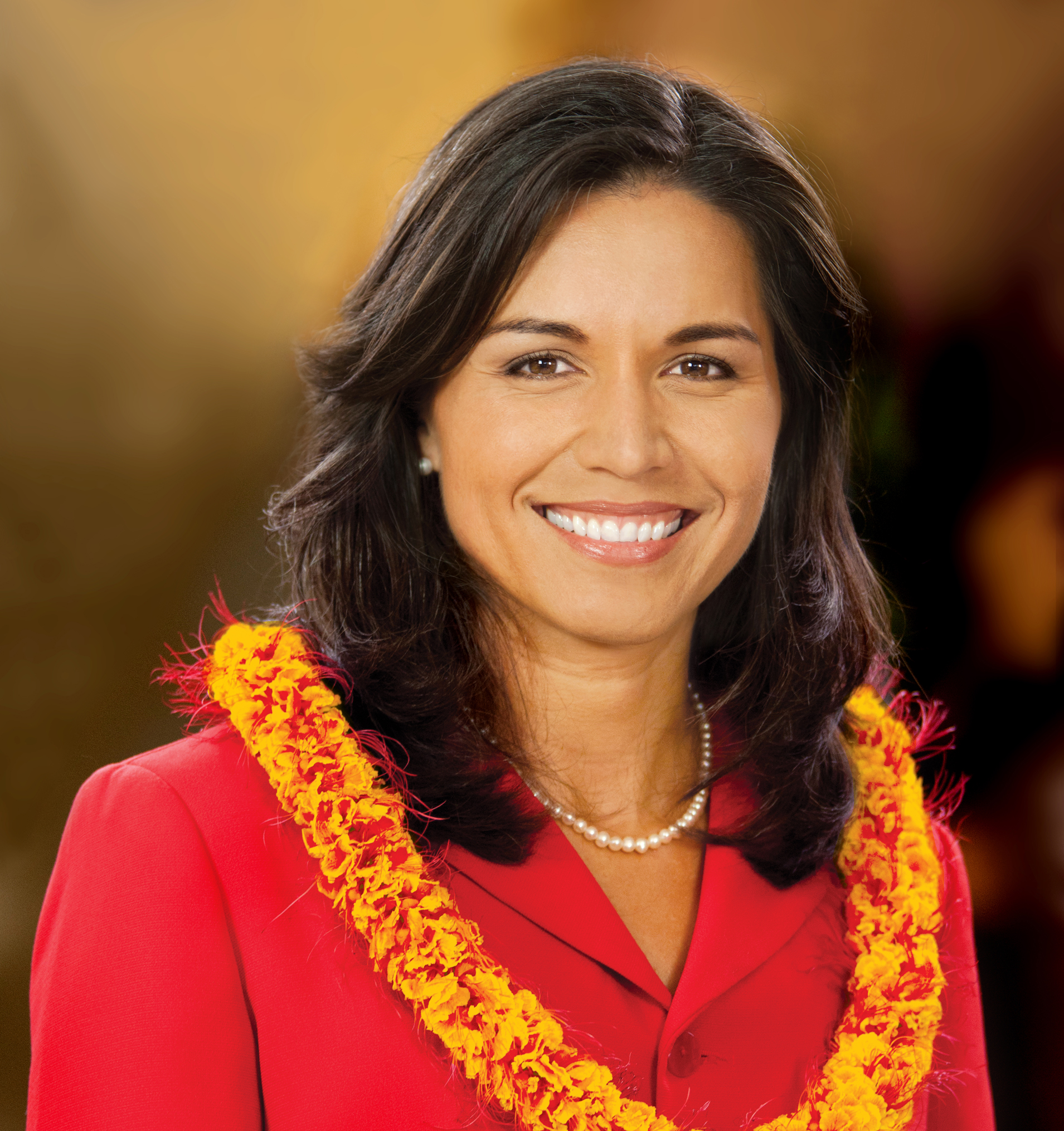Tulsi Gabbard: A Comprehensive Look At Her Life, Career, And Impact
Tulsi Gabbard has emerged as one of the most intriguing political figures in recent years, captivating audiences with her unique perspectives and unwavering commitment to public service. Born and raised in Hawaii, she has carved out a niche for herself as a trailblazer in American politics, breaking barriers as the first Samoan-American and the first Hindu member of the United States Congress. Known for her pragmatic approach to governance and her ability to challenge conventional norms, Tulsi Gabbard has consistently sparked conversations about the direction of U.S. foreign policy, veterans' affairs, and civil liberties. Her journey from a young soldier to a prominent political leader has inspired countless individuals and sparked debates across the nation.
Throughout her career, Tulsi Gabbard has been a vocal advocate for transparency and accountability in government. Her unorthodox stances on issues such as military intervention, surveillance, and partisan politics have earned her both praise and criticism. Despite the polarized reactions she often elicits, Gabbard's ability to remain steadfast in her beliefs has solidified her reputation as a bold and independent voice in Washington. Whether you agree with her views or not, it's impossible to ignore the impact she has had on shaping contemporary political discourse.
Tulsi Gabbard's story is not just one of political ambition but also one of resilience and determination. From her early days serving in the Hawaii House of Representatives to her tenure in Congress, Gabbard has consistently demonstrated a willingness to tackle tough issues head-on. Her experiences as a combat veteran and her deep understanding of global affairs have informed her approach to policymaking, making her a unique and influential figure in American politics. As her career continues to evolve, Tulsi Gabbard remains a subject of fascination for those interested in the intersection of leadership, ideology, and public service.
Read also:Sone 436 The Ultimate Guide To Understanding And Implementing Sustainable Energy Solutions
- Biography of Tulsi Gabbard
- Who is Tulsi Gabbard?
- Tulsi Gabbard's Personal Details
- What Are Tulsi Gabbard's Major Accomplishments?
- Tulsi Gabbard and Her Role in U.S. Politics
- Why Did Tulsi Gabbard Resign from Congress?
- Tulsi Gabbard's Impact on Foreign Policy
- How Did Tulsi Gabbard Become a Public Figure?
- Tulsi Gabbard and Her Stance on Veterans' Issues
- What Makes Tulsi Gabbard Unique in Politics?
Biography of Tulsi Gabbard
Tulsi Gabbard's biography is a testament to her multifaceted life and career. Born on April 12, 1981, in Leloaloa, American Samoa, Gabbard moved to Hawaii with her family at a young age. Her early exposure to diverse cultures and her family's strong emphasis on service and community laid the foundation for her future endeavors. Gabbard's political journey began when she was elected to the Hawaii House of Representatives at just 21 years old, making her the youngest person ever to hold the position.
Before entering Congress, Tulsi Gabbard served in the Hawaii National Guard, where she was deployed to Iraq and Kuwait. Her military service not only shaped her worldview but also fueled her passion for advocating on behalf of veterans and active-duty service members. After returning from deployment, Gabbard continued to serve in the Hawaii House of Representatives before being elected to the U.S. Congress in 2012, representing Hawaii's 2nd congressional district.
Gabbard's biography is marked by her relentless pursuit of meaningful change. Whether it was championing legislation to improve veterans' healthcare or challenging the status quo on foreign policy, she has consistently demonstrated a commitment to addressing the issues that matter most to her constituents. Her journey from a young politician in Hawaii to a nationally recognized figure underscores her ability to inspire and lead with purpose.
Who is Tulsi Gabbard?
Tulsi Gabbard is a name that has become synonymous with boldness and independence in American politics. She is a former U.S. Representative, a military veteran, and a vocal advocate for issues ranging from civil liberties to foreign policy reform. Known for her willingness to challenge both Democratic and Republican leadership, Gabbard has positioned herself as a maverick who prioritizes principle over party loyalty.
One of the key aspects that define Tulsi Gabbard is her commitment to transparency. She has been a vocal critic of government overreach, particularly in areas like surveillance and military intervention. Her ability to articulate complex issues in a relatable manner has earned her a dedicated following, particularly among those who value authenticity and integrity in their leaders.
Gabbard's influence extends beyond her political career. As a public figure, she has used her platform to address issues such as environmental sustainability, criminal justice reform, and the importance of mental health awareness. Her multifaceted approach to leadership and her dedication to serving others have made her a compelling and polarizing figure in the political landscape.
Read also:Ullu New Web Series A Complete Guide To Indias Popular Digital Content
Tulsi Gabbard's Personal Details
| Full Name | Tulsi Gabbard |
|---|---|
| Date of Birth | April 12, 1981 |
| Place of Birth | Leloaloa, American Samoa |
| Nationality | American |
| Political Affiliation | Democratic Party (formerly) |
| Occupation | Politician, Military Veteran |
| Years Active | 2002–2023 |
| Education | Hawaii Pacific University |
| Religion | Hinduism |
| Spouse | Abraham Williams |
What Are Tulsi Gabbard's Major Accomplishments?
Tulsi Gabbard's career is marked by several notable accomplishments that highlight her dedication to public service. One of her most significant achievements was her work on veterans' issues. As a combat veteran herself, Gabbard introduced legislation aimed at improving healthcare and support services for veterans, including the "Veterans Access to Care Act," which sought to reduce wait times for medical appointments.
Another major accomplishment of Tulsi Gabbard was her role in advocating for criminal justice reform. She co-sponsored the "First Step Act," a bipartisan bill aimed at reducing recidivism and improving conditions for incarcerated individuals. Her efforts in this area demonstrated her ability to work across the aisle and address systemic issues affecting marginalized communities.
Gabbard's influence also extended to foreign policy, where she was a vocal critic of U.S. military intervention in the Middle East. Her advocacy for a more restrained and strategic approach to international conflicts earned her recognition as a thought leader on these issues. These accomplishments, among others, underscore her commitment to creating meaningful change through legislation and advocacy.
Tulsi Gabbard and Her Role in U.S. Politics
Tulsi Gabbard's role in U.S. politics has been defined by her willingness to challenge the status quo. As a member of Congress, she consistently pushed for reforms in areas such as surveillance, civil liberties, and foreign policy. Her outspoken nature and independent streak often set her apart from her colleagues, making her a unique and influential voice in Washington.
One of the defining aspects of Tulsi Gabbard's political career was her ability to connect with people from diverse backgrounds. Whether addressing the concerns of veterans, advocating for environmental sustainability, or speaking out against government overreach, Gabbard demonstrated a keen understanding of the issues that matter most to everyday Americans. Her ability to articulate these concerns in a relatable manner earned her a loyal following and cemented her status as a rising star in American politics.
Gabbard's role in U.S. politics also extended to her 2020 presidential campaign, where she positioned herself as a pragmatic and principled candidate. While her campaign did not secure the Democratic nomination, it highlighted her ability to engage with voters on a personal level and address the issues that resonate with them. Her campaign further solidified her reputation as a leader who prioritizes integrity and authenticity.
Why Did Tulsi Gabbard Resign from Congress?
Tulsi Gabbard's decision to resign from Congress in 2023 was a significant moment in her political career. While she did not provide an extensive explanation for her resignation, Gabbard cited her desire to focus on other priorities and explore new opportunities outside of elected office. Her resignation marked the end of a decade-long tenure in Congress and raised questions about her future plans.
Some analysts speculated that Gabbard's resignation was influenced by her frustration with the increasing polarization and dysfunction in Washington. As someone who often found herself at odds with both Democratic and Republican leadership, Gabbard may have felt that her ability to effect meaningful change was limited within the confines of Congress. Her decision to step away from elected office could signal a shift toward other avenues of public service or advocacy.
Regardless of her reasons, Tulsi Gabbard's resignation sparked widespread discussion about the state of American politics and the challenges faced by independent-minded leaders. Her departure from Congress left a void in the political landscape, but it also opened the door for her to explore new ways of making an impact.
Tulsi Gabbard's Impact on Foreign Policy
Tulsi Gabbard's impact on U.S. foreign policy has been one of her most enduring legacies. As a vocal critic of military intervention, she has consistently advocated for a more restrained and strategic approach to international conflicts. Her experiences as a combat veteran informed her perspective, making her a powerful voice in debates about the use of military force.
One of Gabbard's key contributions to foreign policy was her opposition to the Iraq War and her criticism of U.S. involvement in regime-change operations. She argued that such interventions often lead to unintended consequences and destabilize entire regions. Her stance on these issues resonated with many Americans who were disillusioned by decades of costly and ineffective military campaigns.
Gabbard's impact on foreign policy also extended to her advocacy for diplomacy and peaceful resolutions to conflicts. She emphasized the importance of engaging with adversaries through dialogue rather than confrontation, a position that earned her both praise and criticism. Regardless of the reactions she elicited, Gabbard's influence on foreign policy debates was undeniable, and her ideas continue to shape discussions about America's role in the world.
How Did Tulsi Gabbard Become a Public Figure?
Tulsi Gabbard's rise to prominence as a public figure can be attributed to her unique combination of military service, political leadership, and outspoken advocacy. Her early career in the Hawaii House of Representatives laid the groundwork for her future success, but it was her election to Congress in 2012 that truly catapulted her onto the national stage.
As a combat veteran and a member of Congress, Gabbard brought a fresh perspective to Washington. Her willingness to challenge the status quo and her ability to articulate complex issues in a relatable manner quickly earned her a following. Her outspoken nature and independent streak set her apart from her colleagues, making her a compelling and polarizing figure in American politics.
Gabbard's 2020 presidential campaign further solidified her status as a public figure. While she did not secure
Everything You Need To Know About Pro Bowl Games
Discover The Wonders Of Western Australia: Your Ultimate Guide
Understanding The Impact Of Trump Tariffs On Global Trade

Tulsi Gabbard drops out of Democratic presidential primary, endorses Biden

tulsi_gabbard_high1a MORNING MAIL